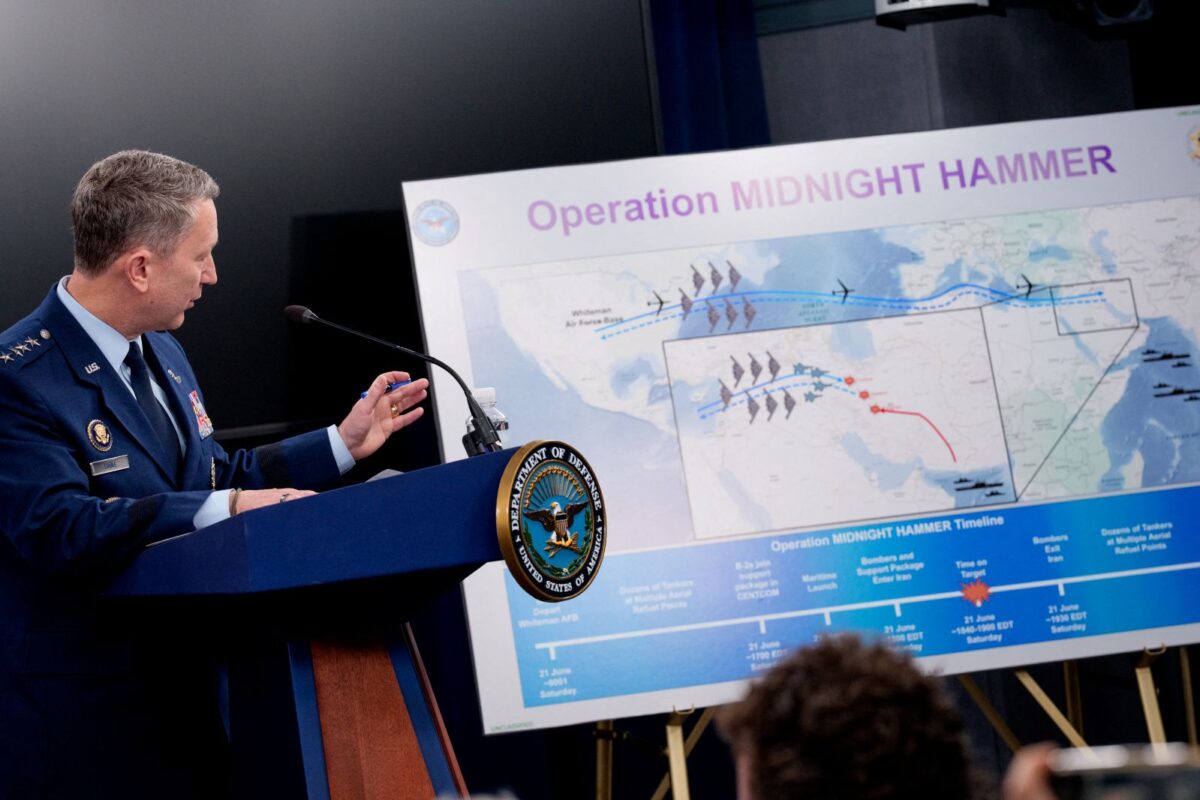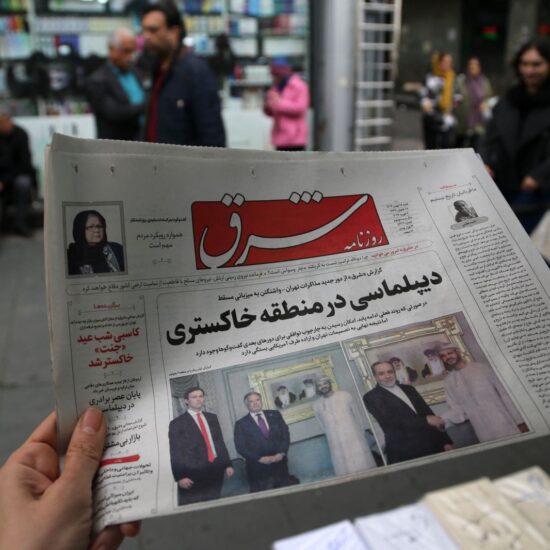
As Iran has promised to retaliate against the USA following coordinated strikes on its nuclear sites, Lebanon faces rising regional tensions with cautious calls for restraint amid fears of broader conflict, while domestic actors navigate political paralysis, social unrest, and the looming threat of being drawn into the escalating Israel-Iran war
In a dramatic turn in the ongoing Iran-Israel war, the United States carried out what President Donald Trump called a “successful” strike on three of Iran’s most critical nuclear facilities. The coordinated assault—conducted in tandem with Israeli forces—marked one of the most significant Western military actions against the Islamic Republic since the 1979 revolution.
The Pentagon confirmed the attack targeted the Fordo, Natanz, and Isfahan nuclear complexes using a formidable array of U.S. firepower. According to Gen. Dan Caine, chairman of the Joint Chiefs of Staff, Operation Midnight Hammer deployed 125 aircraft, including seven B-2 Spirit stealth bombers. The mission also involved submarine-launched Tomahawk cruise missiles and 14 GBU-57 bunker-buster bombs—the only weapons capable of breaching deeply fortified underground sites like Fordo, buried beneath a mountainside south of Tehran.
The strikes, which occurred within a 25-minute window on Saturday night U.S. time, were planned over several months with what U.S. Defense Secretary Pete Hegseth called “full Israeli support.” He stressed that the attack was aimed at dismantling nuclear infrastructure, not military personnel or civilian targets, and rejected claims it was part of a regime-change campaign.
Despite that assurance, Trump took to Truth Social the next day suggesting the opposite: “If the current Iranian Regime is unable to MAKE IRAN GREAT AGAIN, why wouldn’t there be a Regime change??? MIGA!!!”
Iranian authorities confirmed the strikes on their nuclear facilities but downplayed the damage. Foreign Minister Abbas Araqchi, speaking from Istanbul, warned that retaliation was inevitable and diplomacy off the table for now. “The U.S. has violated every norm of international conduct,” he said. “They will understand only when they pay a price.”
Israel has also continued its parallel campaign, launching its own airstrikes on western Iran, while Iran fired missiles at Tel Aviv that injured dozens and destroyed several buildings. The tit-for-tat attacks have intensified concerns of a broader regional war.
Meanwhile, American officials warned of potential blowback at home. The Department of Homeland Security issued alerts for possible cyberattacks and acts of domestic terrorism. Law enforcement increased security at religious, diplomatic, and cultural centers across major cities. The U.S. State Department also advised citizens abroad to remain vigilant amid mounting protests and restricted air travel in the region.
Though Iran has yet to directly retaliate against U.S. military assets or disrupt oil flows, analysts warn that restraint may not last. For now, the world watches as the fallout from this strike ripples through an already volatile Middle East.
In Lebanon
Continuous attacks: Israel’s military claimed it had struck a Hezbollah “Radwan Force” site near Naqoura in southern Lebanon, accusing the group of using the location to plan attacks on Israeli civilians. The strike came shortly after Israel’s foreign minister warned Hezbollah against joining the ongoing Iran-Israel war. The Israeli army also claimed it eliminated a Hezbollah fighter the day before, despite a ceasefire meant to halt cross-border attacks. Lebanon’s health ministry confirmed one fatality from an Israeli drone strike in the same area. Tensions remain high as Lebanon’s army warned it may halt cooperation on ceasefire enforcement due to repeated Israeli violations.
New airport soon?: After years of political deadlock, plans to revive northern Lebanon’s Rene Moawad Airport—also known as Qlayaat Airport—are gaining traction. Once stalled amid allegations that Hezbollah blocked the project to maintain control over Beirut’s main airport, the initiative is now moving forward under a proposed Build-Operate-Transfer (BOT) deal. The Public Works Ministry is seeking Cabinet and Parliament approval for the $120 million plan, which includes construction, operation, and eventual transfer back to the state. While the site currently serves as a military base, its future use remains undecided, with private sector proposals ranging from passenger and cargo services to pilot training.
Fear of war: As U.S. strikes on Iran raise fears of a wider war, Lebanese leaders are urging restraint. President Joseph Aoun warned that Lebanon cannot bear another conflict, while Speaker Nabih Berri reaffirmed Hezbollah’s decision to stay out of the Iran-Israel fight. Despite public pledges of support for Iran, Hezbollah remains on the sidelines amid pressure from Lebanese officials. Behind-the-scenes talks are ongoing to keep Lebanon out of the fray, as U.S. envoy Thomas Barrack pushes for diplomacy and implementation of UN Resolution 1701.
Abou Ali killed: A senior Hezbollah member, Abou Ali Khalil, was killed in an Israeli airstrike in Tehran alongside a leader from the Iran-aligned Iraqi group Kataeb Sayyed Al-Shuhada, according to a Lebanese security source and the group itself. Khalil, who once served as a bodyguard to former Hezbollah chief Hassan Nasrallah, had been on a pilgrimage in Iraq before traveling to Tehran with the Iraqi militant. Both men, along with Khalil’s son, died in the strike, the source said. Kataeb Sayyed Al-Shuhada later confirmed the deaths in an official statement.
UN visit: UN peacekeeping chief Jean-Pierre Lacroix wrapped up his visit to Lebanon as part of a regional tour, marking his final engagement with outgoing UNIFIL commander Major General Aroldo Lázaro. Lacroix toured tense areas along the Blue Line and UNIFIL’s maritime zone off Naqoura, amid growing regional instability. In meetings with Lebanese officials and diplomats, he emphasized the critical role of UNIFIL in maintaining calm in South Lebanon and supporting the implementation of UN Security Council Resolution 1701.
In The Region
Terror attack: At least 20 people were killed and 52 injured in a suicide bombing at a Greek Orthodox church in Damascus on Sunday, according to Syria’s health ministry. The attacker, reportedly linked to ISIS, opened fire on worshippers during mass at Mar Elias Church before detonating an explosive vest. Graphic videos from the scene show widespread destruction and bloodshed inside the church. Emergency teams, including the White Helmets, responded to the attack, transferring victims to hospitals and securing the area. No group has officially claimed responsibility.
Chaos in the region: Iran’s Supreme Leader Ali Khamenei vowed retaliation against “the Zionist enemy” following joint U.S.-Israeli strikes on Iranian targets, marking his first response to the escalating conflict. Meanwhile, U.S. President Donald Trump suggested regime change in Tehran if it fails to “make Iran great again.” In response to the strikes, Iran’s Parliament is weighing a bill to suspend cooperation with the UN’s nuclear watchdog, the IAEA. Lawmakers accused the agency of political bias, though Parliament Speaker Mohammad Baqer Qalibaf insisted Iran is not pursuing nuclear weapons.
Stop Iran?: U.S. Secretary of State Marco Rubio urged China to intervene and prevent Iran from closing the Strait of Hormuz, a key global oil transit route, after Iran’s parliament reportedly backed a plan to do so. Though the final decision rests with Iran’s Supreme National Security Council, any disruption could severely impact global energy markets. Rubio warned that such a move would amount to “economic suicide” for Iran and significantly harm other economies, including China, the largest importer of Iranian oil. Oil prices surged after U.S. strikes on Iran, with Brent crude hitting a five-month high.
Rising death toll: Since October 2023, at least 55,959 Palestinians have been killed in Israel’s ongoing conflict, with 131,242 injured, according to the Palestinian Health Ministry. Recent attacks have left many victims trapped under rubble as rescue efforts struggle to reach them. Israeli forces resumed assaults on Gaza in March, breaking a ceasefire and prisoner exchange agreement, killing over 5,600 and injuring more than 19,000 since then. Meanwhile, Israel faces war crimes charges at the International Criminal Court, which has issued arrest warrants for top officials, and a genocide case at the International Court of Justice.
What We Are Reading
From Meseret, to history: Journalist Valeria Rando highlights a landmark moment as Ethiopian migrant worker Meseret Hailu testifies in Beirut, accusing her former employer of slavery under Lebanon’s kafala system. Her 2020 complaint was the first of its kind in Lebanon, exposing widespread abuses faced by thousands of migrant domestic workers trapped under restrictive laws. Meseret’s testimony reveals years of exploitation, including passport confiscation, abuse, and isolation, worsened by Lebanon’s economic crisis. Her brave stand marks a hopeful step toward justice for many others suffering in silence.
Tehran, Season 4: NOWLebanon’s editor-in-chief Makram Rabbah reflects on the escalating Israel-Iran conflict and its impact on Lebanon. While Hezbollah’s base remains steadfastly loyal to Tehran, many Lebanese, weary from economic collapse and political stagnation, see the conflict as a rare chance to challenge Iranian influence and Hezbollah’s dominance. However, Lebanon’s political leaders largely remain passive, offering little leadership amid growing tensions. Rabbah argues that Lebanon’s urgent priority must be the full enforcement of UN Security Council Resolution 1701, which calls for disarming all militias, starting with Hezbollah—an obligation long ignored but now backed by newfound international momentum.
Hezbollah’s Moment of Reckoning: Political psychologist Ramzi Abu Ismail analyzes Hezbollah’s precarious position amid the escalating Israel-Iran conflict. After suffering heavy losses and strategic setbacks in its 2023-2024 war with Israel, Hezbollah accepted a ceasefire that severely limited its military capabilities. Now, facing pressure to defend Iran in a potential wider war, the group confronts a dilemma: uphold its role as the “resistance” force or avoid risking its survival in a conflict it may no longer be able to sustain. Abu Ismail suggests Hezbollah must weigh whether to engage in a potentially suicidal confrontation alongside Tehran or prioritize self-preservation and adapt to the changing regional landscape.
Lebanon’s security fragility amid regional instability: Journalist Rodayna Raydan covers Lebanon’s cautious response to the escalating Israel-Iran war after Israel’s strike on key Iranian figures. Hezbollah expressed solidarity with Iran but stopped short of military action, amid fears of Israeli retaliation if Lebanon is drawn in. Lebanon’s leaders condemned the attack but focused on preventing regional escalation. A security meeting in Baabda Palace introduced measures to maintain stability, while talks continue to keep Hezbollah aligned with Lebanon’s official stance and out of the conflict.
A battleground and therapy session: Journalist Maan Barazy captures Lebanon’s social media landscape amid the Israel-Iran conflict as a blend of sharp sarcasm and dark humor—a coping mechanism for a nation exhausted by political chaos and hardship. With over 90% of the population online, Lebanese users flood platforms with biting memes and ironic commentary that expose deep divisions and frustrations. From mocking political leaders to making light of tragic events, the online scene reflects a society caught between despair and defiant wit. As missile strikes and regional tensions escalate, Lebanon’s digital spaces become a theater of collective eye-rolling, where sarcasm is both survival and a mirror of national disillusionment.








